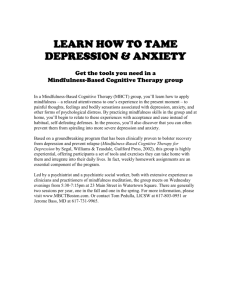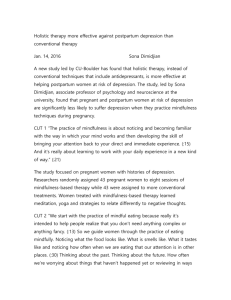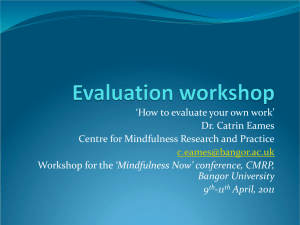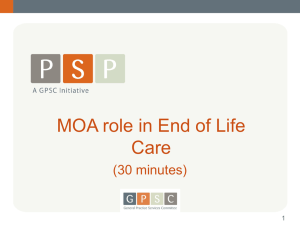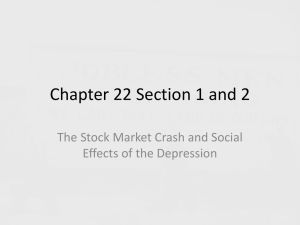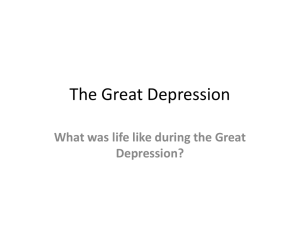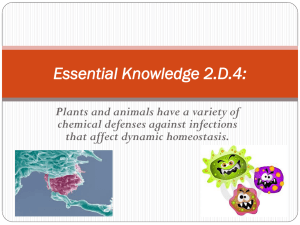Clinical Applications
advertisement
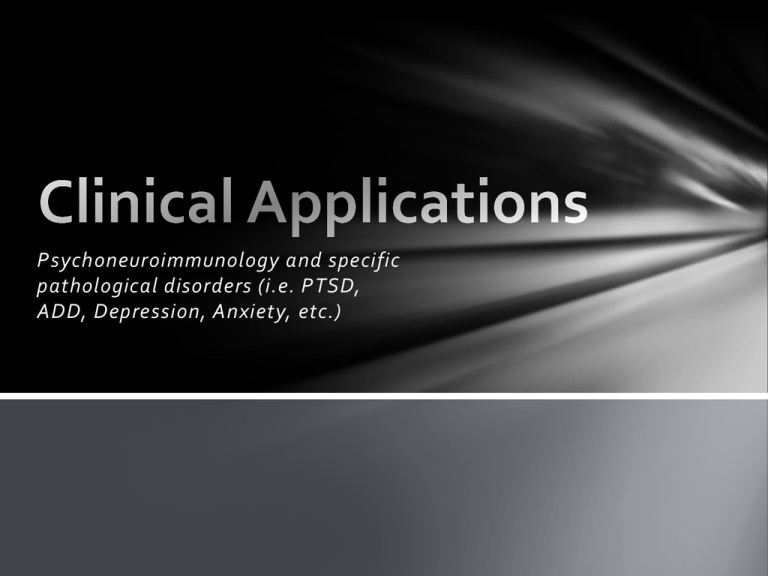
Psychoneuroimmunology and specific pathological disorders (i.e. PTSD, ADD, Depression, Anxiety, etc.) Psychoneuroimmunology 1. The term psychoneuroimmunology was first introduced by Robert Ader during his presidential lecture to the American Psychosomatic Society in 1980. 2. It is essentially an integrative discipline. It seeks to shed light on how mental evens and process modulate the function of the immune system. Immune System Basics 1. The ability of immune cells to circulate, enter extravascular spaces, and recirculate permits their function of detecting pathogens and localizing reactions to them (i.e. causing inflammation). 2. It must detect invaders and abnormal cells to accomplish the task of protecting the individual from microscopic invaders or abnormal cells within the individual. 3. The major cell types of the immune system derive from the hematopoietic stem cells located in the bone marrow. 4. They differentiate into two broad cell types; megakaryocytes and leukocytes (which can differentiate into polymorphonuclear leukocytes (granulocytes and mononuclear leukocytes. These give rise to subtypes including neutrophils, eosinophils, and basophils. The mononuclear leukocytes include the monocytes and the lymphocytes. The latter including; B lymphocytes, and NK or Natural Killer cells. Early Studies: David Spiegel, M.D.’s work at Stanford with 4 stage metastatic breast cancer patients was an initial study that was a booster rocket for the field (though some have called it into question: The psycho/social efficacy was as expected, but the physiological changes shocked all the investigators. A field still in its infancy, but we are learning more each day. An example being that every time you get angry (regardless of the justification or lack thereof) your immune system will be suppressed for up to 6 hours. Physiological Components to psychological disoders: 1. Is sleep deprivation (or hypo somnia…about 5% of pts) a symptom of depression or is depression a symptom of insomnia????? 2. Is low lPFC activity and high RPFC activity a symptom of depression or is depression a symptom of the above?????? 3. Is lack of communication between vmPFC and limbic system a symptom of depression or is depression a symptom of the dysregulation????? 4. The same could be said for obesity, addictive behaviors, impulsive behaviors, etc…..???? PNI An emerging field of study with many implications for psychiatric and spiritual health. Treatment Approaches 1. Implications of chronic stress (Zebras Don’t Get Ulcers)? (Cortisol and DHEA levels) 2. Limbic kindling and couples counseling (cf. Steven Stosny, Ph.D. Improving Your Marriage Without Talking About It (w. Patricia Love). The Red Dragon- Anger Andy Newberg, M.D. makes a profound statement: “Anger is, perhaps, the most dangerous emotion, because it forces us to think, unknowingly, in narrow, superficial ways.” “We do not communicate with clarity or depth of understanding, yet, we feel self-righteous and justified in maintaining our negative beliefs.” What do you think? Have we turned a corner on 1980’s CPE? Are there positive and negative emotions? We, absolutely, know this to be true from an immunological and physiological position. Mindfulness Approaches to TX ACT (Acceptance and Commitment Therapy). MBSR (Mindfulness-Based Stress Reduction) MBCT (Mindfulness-Based Cognitive Therapy) DBT (Dialectical-Behavior Therapy) MAP’s (Mindfulness Awareness Practice) Brain Kamp. Buddhist Psychology (What is it? A philosophy, religion, or psychology?) In fact, what is mindfulness?
